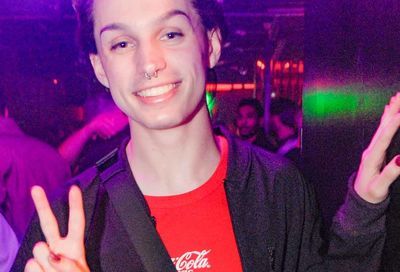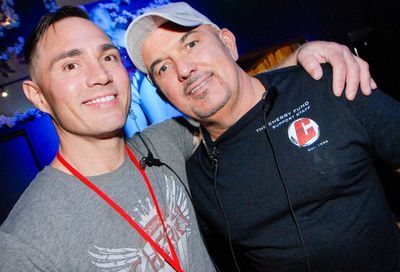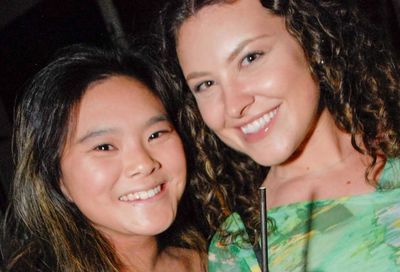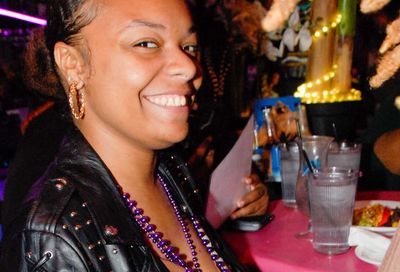Broken Wing
Blackbird is 'edgy' and 'shocking,' but that doesn't make it good
In many ways, the theater is an ideal home for the dramatic treatment of subjects controversial, disturbing and even sickening. Alive, breathing and intimate, the stage offers a human honesty far harder to achieve via film or TV. But if a playwright is to garner respect, he must handle such a subject as if it is a hair-trigger weapon. He must be completely conceptually in control — even when he intends to invoke emotional chaos. As an audience, we must work to separate our resistance or repulsion to the piece from our appreciation of its dramatic and conceptual power. But a playwright venturing into such territory can nevertheless not expect inoculation from a discussion of the value of their play and its effect. Simply put, just because it’s ”edgy” and ”shocking” doesn’t make it good.
And so we come to David Harrower’s Blackbird, a play that begins with a young woman, Una, turning up at the workplace of a late-middle-aged man, Ray, fifteen years after an interaction which irrevocably changed their lives. As we gradually explore what Una seems to want from Ray, we learn the disturbing details of the past and the breadth of their subsequent ramifications. Suffice it to say — and audiences should have at least some warning of this — it is a backstory only a writer for Law and Order: SVU could love.
And here is where the problems begin. Despite some overly ”theatrical” language and devices (no one may ever really believe that either Una or Ray would have stayed in that room for more than five minutes) — there is no doubt that Harrower has intended this play to be grounded in realism. Not magical realism, but plain old SVU realism. This matters greatly because Harrower has chosen to make Una 12 years old at the time of the pivotal events. So when he asks us to consider that perhaps Ray really ”loved” Una and Una still ”loves” Ray, we must accord these possibilities with our perceptions of reality. And I am most sorry, but when one applies reality to this premise, it just doesn’t pass the stink test.
Anyone who has been paying attention (or who watches SVU, for that matter) will be aware that damaged children may develop ambivalent, conflicted feelings towards a perpetrator. And anyone who has ever known a 12-year-old girl and a 40-year-old man will know that Ray’s interpretation of his feelings fall squarely in the realm of rationalization. If Harrower wanted to suggest a deeper complexity here, he failed.
But not only is exploring the possibility of an unorthodox love affair absurd in the way that Harrower has presented it, in reality it is also a thoroughly irresponsible interpretation of the sad repercussions of abuse. Studio can tell us all it wants that Blackbird will ”inflame existing assumptions and dare the audience to rethink the meaning of love stories” but simply re-arranging the facets of a relationship until they are discordant and offensive does not equate with the hard work of examining what we mean by ”love.” The emotions and psychologies of Una and Ray, the explosiveness of putting them in a room together — all of that ugliness, despair and genuineness is truly worthy of exploring. But Harrower negates his effort with repulsive contrivance.
Having said all that, Harrower himself says he wishes to see audiences ”shaken up.” So I suppose if that’s all he is trying to do, then he has succeeded.
But then there is the writing itself. Despite the ”riveting” nature of this confrontation, it seems at times to drag on forever. In real life, terrible fraught moments are often brief, failed, and filled with words to blunt the fear. Here, Harrower artificially protracts the encounter, fills it with unnatural (versus awkward) silences and makes, especially Una, ask the kind of questions only people in plays ask. And despite the endless back and forth, nothing justifies or builds with sufficiency to the physical confrontations that eventual come, most especially the toe-curlingly incongruous Hollywood-style room-trashing scene. We need far more to see why these two people stay in this dangerous, claustrophobic space and how they could bear to touch, even in anger.
Although not enough to salvage the play, Harrower deserves credit for the very well-conceptualized and written monologue in which Una describes the last time she saw Ray those many years ago. It is a rapture of the loneliness of the unrequited encounter and would have been brilliant if she had been, say, 16, versus 12 at the time. Lisa Joyce, playing Una, gives her all to this monologue and it shows. She is engaging and believable when she forgets herself but less effective when she gets bogged down in actorly affect and her tendency towards Jennifer Aniston’s style of Cute but Troubled.
To his great credit, Jerry Whiddon plays Ray to the max, adeptly walking the line between damaged and predatory with tremendous clarity and credibility. In his performance, we can see what this play could have been had Harrower chosen to be less ”edgy” and more authentic.
Support Metro Weekly’s Journalism
These are challenging times for news organizations. And yet it’s crucial we stay active and provide vital resources and information to both our local readers and the world. So won’t you please take a moment and consider supporting Metro Weekly with a membership? For as little as $5 a month, you can help ensure Metro Weekly magazine and MetroWeekly.com remain free, viable resources as we provide the best, most diverse, culturally-resonant LGBTQ coverage in both the D.C. region and around the world. Memberships come with exclusive perks and discounts, your own personal digital delivery of each week’s magazine (and an archive), access to our Member's Lounge when it launches this fall, and exclusive members-only items like Metro Weekly Membership Mugs and Tote Bags! Check out all our membership levels here and please join us today!
























